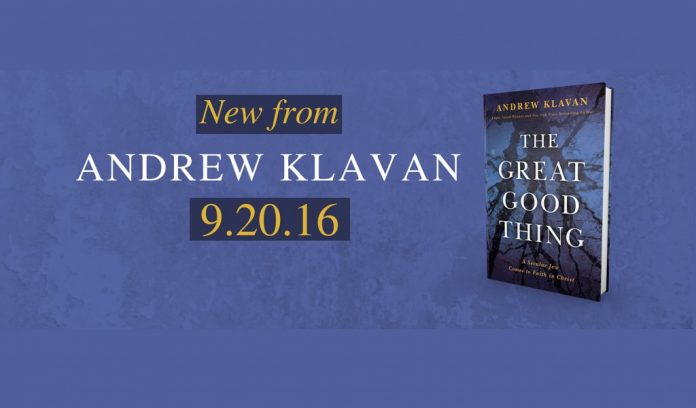A couple of weeks ago, Amazon shipped out a book by American conservative writer Andrew Klavan. It’s an autobiography with a weird title, The Great Good Thing. It’s not about how America is great, or how being a conservative is fantastic, or how awesome his life is. (Okay, maybe he goes over his pretty sweet adult life.) It is instead about his life growing up in a Jewish household, living life as an agnostic, and, at almost 50 years old, finding faith in Christ. As its subtitle succinctly explains, “A secular Jew comes to faith in Christ.”
When this was introduced to me by a podcaster I listen to, I felt compelled to read it. As someone who is exploring their faith again, I couldn’t help but wonder if Klavan had some answers.
While he did not have the answer to “Should I subscribe to Christian beliefs?” he had other answers. Klavan is the kind of man who makes sure everything makes sense. Even as a child, his stories had to make sense, otherwise he scrapped them. If a character was capable of flying, why did he have wings? Whether the fantasy is causally possible is irrelevant, so long as it can logically happen. If he was a part of a science experiment to become superhuman, he did not have to know how the science worked; it just did.
Why is that important? I thought the same thing throughout the book. It is not until Chapter 11 of 14 that Klavan comes to his five epiphanies to finding God, and even those are vague. In the acknowledgements, Klavan admits the book was twice as long before his wife helped edit out unimportant bits. I came to realize a little too late that he writes everything because it provides important context. The fact he did not study for his bar mitzvah and ad libbed his prayers tells us he never believed in what he actually was supposed to, as demanded by his father. So when reading the book, it is important to remember that all writing has a purpose, and it is your responsibility to find that purpose.
Klavan answers probably the most important question for all people considering religion: is it possible for an intellectual thinker, who wants unambiguous answers to everything, to believe in a God who made the world and its laws? Can someone like Klavan really settle for God to be the first cause? His answer is yes, and his five epiphanies bring him to that conclusion. The short version is the idea of morality being absolute, and therefore a God must have created them, otherwise moral assignments from anyone else are arbitrary and subjective. Whether or not that is convincing is up to you, so long as you have at least read his position.
Some might not find his book as a convincing explanation of why Klavan became baptized. In the first few chapters, Klavan mentions he always believed in a god, but he wasn’t sure who that god was, and if any faith would align with his vision of God. He mentions it again at least a couple more times. He describes miracles as not mere coincidences, where others would brush them off as sheer luck.
Nonetheless, Klavan describes in vivid detail his adventures from age five to 50 — a 45-year path to God and Jesus Christ. To add context, Klavan is normally a mystery-thriller writer, and The Great Good Thing works with that style, despite it being about his journey to faith. His story is quite the adventure. He traveled across America, moved to London, and, for the longest time, could not successfully sell one damn book. Yet here he is, famous for writing books such as True Crime and Empire of Lies, and the movie One Missed Call.
I recommend this book to anyone like myself who still questions their faith, and even to those who are confident in their position to explore different ideas and opinions. I also recommend it to pastors, rabbis, and other such religious leaders to remind them that zealotry without belief doesn’t get anyone anywhere. Religious parents would find this useful to know what not to do when raising their children in a religious household. Overall, I recommend this to anyone who wants to know why certain people turn to faith.
Overall, The Great Good Thing was enjoyable and eye-opening from front to back.


